撰文/CHINESE : JIN TAO
攝影/PHOTOS : Nick D for precursorprints.com, Maurice Choi
特別感謝/Special thanks to: Puyi Optical, Ms. Brae Ho.
Linda Farrow在近幾季可謂是脫穎而出。隨著他們合作名單的不斷加長,逐漸佔據了人們的視野。然而,Linda Farrow並非一夜成名,它創立于70年代,由品牌同名創始人擔當設計。現在的設計我想可以被稱為2.0版。關於其中的意義,我們有幸與創意智囊團Simon Jablon以及Tracy Sedino進行一次對話。不僅深入探討了品牌的復興,更發現了品牌與中國市場的緊密聯繫!在這裡也與大家分享一二。
Linda Farrow has really come to the fore the last few seasons. As their lists of collaborations grows everyone has really began to take notice. Linda Farrow isn’t just an upstart. It was a label in the 70’s designed by its namesake. Now, I guess you can call it version 2.0. We were given the opportunity to chop it up with the creative brain trust of Simon Jablon and Tracy Sedino. Not only did we delve into the brand’s revival but also discovered it’s strong connection to China as well! Read on.
< English continued after the Chinese >
SPITGAN – 看你的履歷可以發現,你年輕的時候曾經去過中國。
Simon Jablon – 是的,是的。(笑)我很少談論這部分。
SG -為什麼不呢?這可是你履歷上的頭一部分呢!
Tracy Sedino – 是我寫的履歷哈哈
Simon Jablon – 我年輕時打過乒乓球所以……可以說我的水準還不錯,我得到了這樣一個機會……我在英國的的教練曾效力于中國國家隊。我12歲時得到機會,和一個朋友一起來到中國國家隊訓練了一整個夏天。所以是3個月的時間……
Tracy Sedino – 沒有和父母一起!
Simon Jablon – …所以這是一次不錯的體驗。後來,隔年我又再度一個人回來了。又在北京待了六周。
SG –你的中文很不錯嗎?
Simon Jablon – 不,Boo How(不好)哈哈。
SG -你學到很多東西嗎?乒乓球課程如何?是不是很嚴格?
Simon Jablon – 是外交形式的。從專業程度上來說完全是在不同的水平線。這也讓我在很年輕的時候就瞭解到,中國是一個怎樣的國家,它有著怎樣的潛力,不管是它的面積還是它的人口的數量。那麼年輕便充滿了奉獻與敬業精神!我瞭解到,每個人都是如此執著。12歲便和我同齡人甚至比我更小的孩子們一起訓練,就好像在服兵役一樣。在英國受訓時,打乒乓球就是一項運動,樂趣無窮。你不想做便可以偷懶。哈哈。可在那裡,你要是胡來就等著受罰吧。如果我偷懶的話,會有人走到我身後踢我一腳,讓你記住教訓。其實這很好。我的確長進了不少。我也真得特別享受那樣的經歷。在某種程度上這也讓我成為了現在的我。這是人生寶貴的一課,那時的北京和現在的城市面貌相比也是相距甚遠。
SG –有沒有什麼令你印象特別深刻的?
Simon Jablon – 事實上,北京也是我剛去的前一兩年時間才開放起來。我去的時候,麥當勞剛剛開張,是全中國第一間麥當勞。在當時那可是頭號新聞。還有友誼商場!你聽說過友誼商場嗎?一座很老的百貨公司,它們有自己的產品線。我的朋友長著一頭金髮,所以大家都來摸摸他的頭髮說是可以交好運!這對我來說挺新鮮的!我們去中國的時候還那麼小!除了去中國的中國生意人外可能還沒有外國小孩去呢。所以看到兩個外國小孩對他們來說是很新奇的。這也是很有趣的經驗,我很懷念。那是非常真實的中國,自行車隨處可見,每個人都騎。整條街邊都是自行車停放區…
SG –顯然你們後來又故地重遊過。
Tracy Sedino – 我只有8年前回去過。因為溥儀(眼鏡)的關係我去了不少地方。
Simon Jablon – 我們去了很多地方,去成都看了大熊貓,還有上海,北京,深圳,廣州…
Tracy Sedino -去年夏天,我們去了7個城市。
SG –所以現在這差不多是每年的固定行程咯?
Tracy Sedino – 每年,或者每兩年?向人們普及Linda Farrow。
Simon Jablon – 已經頗具成效了。
SG –所以這算是你們比較側重的市場?
Tracy Sedino – 亞洲。整個亞洲都是。
Simon Jablon – 我覺得市場之間也有著相互推進的作用。因此,我們來中國的目的也不僅僅是因為專注于中國市場。
SG – Linda Farrow曾經休業過一陣子,這其中有沒有什麼特殊的原因呢?
Simon Jablon – Linda Farrow是我母親。她創業于1970年,基本上到了80年代中期,業務逐漸繁忙了起來。我的父親是製造商,他分管業務,以及工廠的部分。我們曾經與Balanciaga,Yves St. Laurent…合作,包括生產以及分銷。所以,他也很忙。隨著業務日益壯大,母親決定把更多的精力投入到家庭以及撫養子女上,把大部分時間花在我們身上。她不想再工作了,我覺得我們很幸運的是,父親的位置能夠讓我們做出那樣的決定。他們把所有東西都鎖進了倉庫,就像時間膠囊一樣保存了下來,而幸運的是,Tracy和我,在10年前發現它們。
SG –你們以前不知道嗎?聽起來有點家族傳奇的感覺?
Simon Jablon – 其實我是知道有這麼回事,但是當你還是孩子的時候,你完全不會在意父母在做什麼。
SG – HAHAH。
Simon Jablon – 我從來沒關心這些事情。就像我能確定貝克漢姆的孩子們不知道他們的父母已經擁有了多麼龐大的資產;直到他們長大後,才會慢慢瞭解他們周遭的世界。小時候總是很天真的。所以我們真的不了解。同時時尚的世界也在變遷。大約10年前,復古風突然變得非常非常受歡迎,從前人們對復古沒有太大的需求。我們抓住了一個良機,我們有保存完好的復古的產品,LVMH也剛剛並購了Emilio Pucci。我們有所有保存完好的Pucci精品。對於我們來說,那是一個良機。切入的時間點對我們來說非常重要。我覺得每個人做事時,都需要那麼點運氣。
SG –關於你說的保存完好的Pucci精品,是什麼?
Tracy Sedino – 墨鏡檔案庫。
Simon Jablon – 復古以及檔案庫,那是一個奢華的世界。雖然從時尚的角度來看,復古風很熱門。但奢華的世界並不那麼熱衷於二手服飾什麼的。所有我說的是完好無損的以及未使用過的精品…
SG –所以是復古以及新品的組合。這是時下最火的趨勢。
Simon Jablon – 哦,毋庸置疑!在日本,和倫敦,你都能看到這樣的趨勢。當你去義大利這樣的地方他們會喜歡這樣的電子。他們會覺得很酷,當他們看到雜誌上比如Kate Moss穿著一件復古裘皮大衣他們會覺得很棒,然而事實上,義大利人喜歡的卻是很新很乾淨的東西。
SG -所以這與文化有關是嗎?
Tracy Sedino – 絕對。
SG –其實中國人也是如此。我來自加拿大,所以我比較開放,但是在香港這兒,人們喜歡新的東西。
Simon Jablon – 是的中國普遍熱愛新事物。就像英國的樓市一樣,中國人很喜歡在英國買樓。他們什麼都買,但是他們只買新樓。他們不喜歡老舊的建築,但事實上那些老舊的建築可能是很好的建築。
SG –你的意思是老建築可能更寬敞或者更具個性?
Tracy Sedino – 是的,更大。
Simon Jablon – 是的,用料更好,更結實。
SG -那麼,你們有推出新的設計嗎?
Simon Jablon – 是的。現在我們的設計都是新的。我想可能很多設計師都會從老檔案中汲取靈感,但我們不會。可能我們會保留一些東西,但就整體而言一切都是全新的。新的設計,新的作品。
SG –是不是因為你們的檔案容量太大。
Simon Jablon – 實話跟你說,如果我有時間的話我的檔案庫會更大。而我真的沒有時間去身體力行做挖掘和歸檔工作。我們成立公司以來,便是朝九晚六的工作。然後,Tracy還得做她的工作,而我則是在倉庫整理目錄到淩晨2時。然後我會去接她下班,再回去。再一起做……
Tracy Sedino –有一年之久。
Simon Jablon – …差不多一年吧。每天都在整理。在一定程度上我們也獲益頗豐!我們做了很多工作,但還有很多可以挖掘的。只是沒有時間!因為不斷有新產品,新理念的到來……但復古永遠不會變,所以我們把它們留給我們的孩子們!HAHAH。
Tracy Sedino – 再過個10年20年嗎!HAHAH。
SG –那麼為何能夠受到那麼多時裝品牌的青睞呢?看起來似乎你們和所有人都跨刀合作過!
Simon Jablon – 我想可能是我們是唯一能夠與他們掛鉤的吧。
Tracy Sedino – 他們也是我們的朋友。比如Phillip Lim,Prabal Gurang,Alexander Wang。我們以前就是朋友。Linda Farrow是作為一個時尚配件品牌而存在的,我們專攻于此。不論是市場行銷還是銷售,我們始終圍繞著這個行業在打轉。
Simon Jablon – 我想我們就是為此而生的。就像你父親是做配鏡師的……你就出生在這個行業裡。就這樣一代一代繼承下來。來自外界的人士會覺得這是一個很陌生的行業。而大多數其他眼鏡設計師們都是真正的配鏡師或工程師,他們並不真正瞭解時尚。所以他們試圖從光學界跨越到時尚界是行不通的。而我們則是時尚人士,我生於時尚業。我也瞭解製造業,我知道他們的運作模式,但時尚才是我真正的興趣所在。因此設計師與我們合作的原因是,我們能夠開啟一段時尚對話,我們瞭解他們以及他們想表達什麼。這不是一般的對話,我們所做的是超越,而不是追趕。
SG –這一季你們做的樣品太耀眼了,到處都可以看見!
Simon Jablon – 謝謝你。
SG –但這是永無止境的工作,就像在Style.com找墨鏡一樣。
Tracy Sedino – HAHAH。
Simon Jablon – 是呀。這確實需要大量的工作!HAHAH。我不知道怎麼能夠擠出時間,但是看到我們的作品被秀出的時候我真得感到非常滿足。我們這些年的付出總算有所回報。這種回報無關商業利潤,是能夠與設計師一同工作的機會。我們和Raf Simons,山本耀司還有Dries Van Noten合作過……我想,當我們快要入土的時候,能夠回頭望去,在50-60年間,我們與這些人合作一同創造出這些作品!
SG -是啊,這種感覺真棒,你提及的年輕一代也是有前景的設計師。
Tracy Sedino – 是的,不是同一類的設計師。我們希望同自己真正敬仰的設計師合作。我們不會挑選一種類型的設計師。你可以發現和我們攜手過的品牌都有自己的獨到之處。
Simon Jablon – 和設計師攜手合作不是商業化的決定。我們曾有大公司來找我們合作,而且那些公司能夠賣出很多眼鏡,但我們並不想走上這條路,因為我們想和真正喜愛自己產品與品牌的設計師合作。創作產品需要激情,我們很看重這點,我們很樂意創造新奇與新鮮的東西。我覺得當我們開始為大品牌做普通眼鏡的時候就會抹殺我們之前所信奉的一切。
SG -我想我能夠看出這點。
SG -好吧,剛剛被告知我還能提問一個問題,但我還有兩個問題?
Tracy Sedino – 請問吧。
SG -首先,我想問你如何看待沒有鏡片眼鏡的流行趨勢?
Tracy Sedino – 哦,你指的是谷歌眼鏡?
Simon Jablon – 不,不,不。應該是香港的一種潮流。
SG –沒錯,這裡是這種潮流的發源地。
Simon Jablon – 我沒有在別的地方看到太多這種香港的潮流。嘿,其實這是好事呀!更多人帶我們的眼鏡不是更好嗎!HAHAH。
Tracy Sedino – HAHAH。
Simon Jablon – 你知道麼,我之前已經想到這個問題了。隨著科技日新月異,鐳射手術普及以後會怎樣。20年後,沒有人需要戴眼鏡了但是我們就把它們拋棄了嗎?很多時候眼鏡定義了一些人。一些最具代表性的人物都是由眼鏡來定義的。所以,這就好像是一個時尚宣言。所以我覺得戴沒有鏡片的眼鏡,是一種比平時配戴普通眼鏡更明朗的宣言。所以,如果他們認為眼鏡能夠界定他們,為他們增添一些個性,那便是時尚了對不對?為自己創建一種與眾不同的特徵,不是很好嗎?就像Jeremy Scott一樣不走尋常路。為什麼穿帶翅膀的鞋?為什麼不呢?
SG –作為妻子與丈夫,有什麼內在的挑戰嗎?都笑了。
Simon Jablon – 沒有,這是完美的組合!Hahahaah。
Tracy Sedino – 我的辦公室就在樓下!我在不同的樓層有一間自己的房間!
SG -因此,有獨立的空間。
Simon Jablon – 嗯,你需要它。
Tracy Sedino – 當我們共用一間房間工作時(壓低聲音),可不是那麼輕鬆的。但我們從未心存芥蒂。如果有矛盾很容易就過去了。我們有時候會爭執,但是兩分鐘就好了。
Simon Jablon – 我認為如果我們從不爭執就不會有激情。如果沒有激情,又如何能置身于這個行業。創作需要激情。我們帶著愛攜手走過高潮與低谷,時尚總有利弊。所以這是好事,我們做著不同的工作因此我們之間也會有差異。
Tracy Sedino – 是的。
Simon Jablon – 我們互相尊重對方所做的事情以及行事原則,這是最重要的。同時,我們能夠為對方所做的最好的事情就是彼此給對方多一點點空間!
< English continued below >
SPITGAN – I understand from looking at your bio you’ve been to China when you were young.
Simon Jablon – Yeah. Yeah. Laughs. I rarely talk about this part.
SG – Why not?! It’s the first thing in your bio!
Tracy Sedino – I wrote it! Haha.
Simon – I played table tennis when I was young so…I was a decent standard you could say. I got the opportunity…my coach in England played for the national team in China. I got the opportunity when I was 12. Me and a friend came and trained with the national team in China for a whole summer. So for 3 months…
Tracy – without parents!
Simon – …so that was quite an experience. Then I came back again on my own the year after. I did another six weeks in Beijing after.
SG – Was your Chinese pretty good?
Simon – No. Boo how(mando)haha.
SG – Did you learn a lot there? How was the teaching of table tennis there? Was it quite strict?
Simon – It was regimental. It was a different level of professionalism. It made me realize at a very young age what China is, and it’s potential, as much as from its size and volume of people. It’s kinda the dedication and professionality at such a young age! People really are focused. That’s what you learn. 12 years old being out there training with people my own age or younger, it’s like military service. To train when I played table tennis in England, it was a sport, and fun. You can get away with things. Haha. There, it was like you mess around and your in trouble. If I’m was being lazy someone would walk up behind me and kick me, and you would learn, you know. It was good. My level picked up a lot. I really enjoyed the experience. It made me who I am today to some degree. It’s part of the learning curve, and Beijing back then is a far cry from what it is today.
SG – What do you remember about it?
Simon – Well actually the curtain (had) just raised just one or two years before I went there. They just opened McDonald’s when I was there. The first McDonald’s in China. I remember that was big news. The friendship store! You heard about the friendship store? It was like an old department store. They had their own products and things like that. My friend he was blonde, so everyone would come up to him and touch his hair for good luck! It was new! The fact that we were so young! It was like (we were) the first people they saw coming into China that weren’t the middle aged business men. So to see 2 kids turn up was novel to them. It was an experience. Fun. I really liked it. It was more real China. There were bicycles everywhere. Everywhere. There were parking areas of just bicycles, streets long…
SG – You both have been back obviously.
Tracy – I only went back 8 years ago. I’ve travelled quite a bit of it with Puyi (Optical).
Simon – We’ve done everywhere from Chengdu, saw the pandas, Shanghai, Beijing, Shenzhen, Guangzhou…
Tracy – Last summer we did like 7 cities.
SG – Is it almost a yearly thing for you guys now?
Tracy – It’s been every year, every two years? Educating people about Linda Farrow.
Simon – It’s picking up as well.
Photo – Maurice Choi
SG – So it is a big focus, this market?
Tracy – Asia is. Asia on a whole.
Simon – I think one market lends itself to another. So it’s not a case of coming and focusing on China.
SG – Linda Farrow was discontinued for a little bit, was there any particular reason?
Simon – Well Linda Farrow was my mom. She started in 1970. Basically in the mid-80s, my mother was getting quite busy. My father manufactured it, he was the business side of it. The factory side. We used to do collaborations with Balanciaga, Yves St. Laurent…the manufacturing, the distribution (as well). So he was busy. The business was doing well, so my mother decided to focus more on the family and bringing us up, spending more time with us. She decided she had had enough really. I guess we were fortunate my father was in a position where we could afford to make that decision. Lucky enough, Tracy and myself…they put everything in a warehouse and literally locked it up. It was like a time capsule. We were lucky enough 10 years ago to discover that.
SG – You didn’t know about it? Was it a bit of a family legend or something?
Simon – I would say I knew about it but when you’re a kid you don’t really respect what your parents do.
SG – Hahah.
Simon – It doesn’t really connect. Like I’m sure David Beckham’s kids don’t really recognize the scale of what his parents have achieved; until they are actually older and will understand the world around them. There was a definite naivete. We didn’t really know. Also the world changed, talking about fashion. Around about 10 years ago, where vintage became very, very popular. Previous to then there wasn’t a huge demand for it. Our timing was very lucky, we had vintage product in mint condition, and LVMH had just bought Emilio Pucci. We had the whole archived vintage Pucci’s as well. For us it was timing. Timing was very important for us. I think for everyone who makes it, you need that little bit of luck.
SG – You had what for Pucci? You had their archives?
Tracy – Sunglass archives.
Simon – Vintage and archive, it was a luxury world. Even though from a fashion perspective, vintage was hot. The luxury world wasn’t so big into second hand clothing like that. The fact that it was in mint condition and unused…
SG – The mix of it though, vintage and new. You could definitely see that happening, and trickling up.
Simon – Oh definitely! In Japan, and London, you could definitely see that happening. But you go to somewhere like Italy…they liked the idea of it. They thought it was cool, and they would read the magazines, but the opinion was…it’s like, Kate Moss in a vintage fur coat, it’s very cool but the Italian’s like everything to be very new and clean.
SG – So it’s a cultural thing.
Tracy – Totally.
SG – Cuz the Chinese are kind of like that too. I come from Canada so I am very open to that, but here in HK, they prefer it new.
Simon – Yeah the Chinese love everything new. Like even things in the UK, like the property market. The Chinese are in it heavy. They are buying everything but they only want to buy the new buildings. They’re not really interested in the old buildings, which in fact might be the better buildings.
SG – Yeah. They would have more character? and bigger?
Tracy – Yeah, bigger.
Simon – Yeah, better made. Solid.
SG – So are you guys coming out with new designs?
Simon – Yes. Everything we have now is completely new. I guess like any designer you can take inspirations from archives and things like that, but we don’t. Of course, we may take the odd bit, but on the whole everything is new new. New designs, new creations.
SG – Cuz your archives are extensive.
Simon – To be honest with you, if I had the time I would have a bigger archive. I physically don’t have the time to dig through and catalogue everything. When we started the company, we were working from 9 AM to 6 PM. Then Tracy had to go work her job and I stayed at the warehouse cataloguing everything until 2 in the morning. Then I’d go pick her up from work and go back at it. We did that together…
Tracy – ..for a year.
Simon – …yeah for a year sort of. Everyday working on that. It paid off to a certain degree, so we’re here! We did a lot of work but there’s still more to dig through. No time! There’s always new products, new ideas so…the vintage will always stay there, so we’ll leave that to our kids! Hahah.
Tracy – and another 10 years, 20! Hahah.
SG – Why are you guys so popular with fashion brands? It looks like you guys have crossed over with anyone and everyone!
Simon – I think we’re the only ones that can relate to them.
Tracy – They’re like our friends too. Everyone from Phillip Lim, Prabal Gurang, Alexander Wang. They were friends beforehand as well. Because we’ve specialized, we like to think of Linda Farrow as a fashion accessory. Everything from marketing to distribution, we’re always around people in this industry.
Simon – I think I was very, how do you say, born into it. Incestuous…it’s kinda one of those industries your born into…Oh your father’s an optician. You know, it kinda gets handed down generation after generation. People that kind of come from the outside see it as one of those strange industries. Most of the other eyewear designers are really like opticians or engineers. They don’t really understand fashion. So whenever they try to cross over from optical to fashion it doesn’t work. Where we consider ourselves fashion people. Where I was born into the industry. I understand manufacturing, I understand how to do these things but my interest is really fashion. So the reason designers work with us is we can sit down in a fashion conversation and understand who they are, and what they’re talking about. It’s a different conversation. We’re transcending the other way instead of trying to do something we can’t.
SG – Because this season the set of samples you guys have done looks amazing, and it’s all over the board!
Simon – Thank you.
SG – Buts it’s endless. It’s a who who. It’s like looking at the Style.com of sunglasses or something.
Tracy – Hahah.
Simon – Yeah. It takes a lot of work! Hahah. I don’t know how I find the time but it’s satisfying when it gets to the shows and things like that. The work we’ve put in over the years, it pays off. It’s not to say business or financial, but it’s a reward to work with the designers. We’ve worked with people like Raf Simons, Yohji Yamamoto, Dries Van Noten…I think when we go to our grave one day we can turn around and go, in 50-60 years, we’ve worked with these people and created product with these people!
SG – Yeah that’s awesome. Even the young ones that you’ve mentioned, they’re designs too.
Tracy – Yeah it’s not about one type of designer. We like to work with a series of designers that we really respect. We never pick designers that are too similar to one another. With all the brands we work with you can see a distinctive signature that is them.
Simon – It’s never a commercial decision why we work with designers. We’ve had big companies come to us, and obviously they can sell lots of glasses but we don’t want to go down that route cuz we only want to work with designers that love their craft, and love their brand. We identify with that. We feel there’s a passion to create a product, and we are excited to do this and do that, and create something new and fresh. I think if we started making generic eyewear for a big brand it would kill everything we stand for.
SG – I think you can see that.
SG – Ok I’m being told last question. Can I have 2?
Tracy – Yeah sure.
SG – First, I want to ask you what do you think of the trend of no lenses in glasses?
Tracy – Oh is that the Google glasses?
Simon – No no no. It’s a very Hong Kong trend.
SG – Yeah! It came from here. Then LMFAO got on it.
Simon – It’s a very Hong Kong trend. You don’t see it in too many other places. Hey why not you know! The more people wearing our glasses the better! Hahah.
Tracy – Hahah.
Simon – You know what. I’ve thought about this before. With the way that technology is changing, laser surgery, who knows. In 20 years, no one will need our optical glasses but does that mean we should get rid of them? A lot of eyewear defines a number of people. Some of the most iconic people are defined by their glasses. So you know, it’s a fashion statement. I think the reason they wear the ones like that (glasses with no lens), it’s a stronger statement than the simple generic glasses, they normally where. So if they think it defines them a bit, adds something to their character, I think that’s what fashion is about isn’t it? Creating an identity. Slightly particular but why not? Like Jeremy Scott is not exactly normal. Why wear shoes with wings on them? Why not?
SG – Working together as husband and wife, are there inherent challenges to that?
Both laugh.
Simon – No it’s perfect! Hahahaah.
Tracy – My office is downstairs! I have a completely different room on a different floor!
SG – So there’s space.
Simon – Ah, you need it.
Tracy – When we used to work in the same room (low voice), it wasn’t so easy then. But we both don’t take…hold grudges is the word. We can get past it quite easily. We can have a fight, then 2 min later we’ll be over it.
Simon – I think if we didn’t fight we wouldn’t be passionate. If your not passionate, you wouldn’t be in this industry. You can’t create. We took that love, and with the ups come the downs, and fashion has pros and cons. So it’s good, but the difference as well is, we don’t do the same job.
Tracy – Yes.
Simon – So we respect each other in what we do, and how we do it. That’s the number one thing. But the best thing we did for each other was give each other a little bit of space!
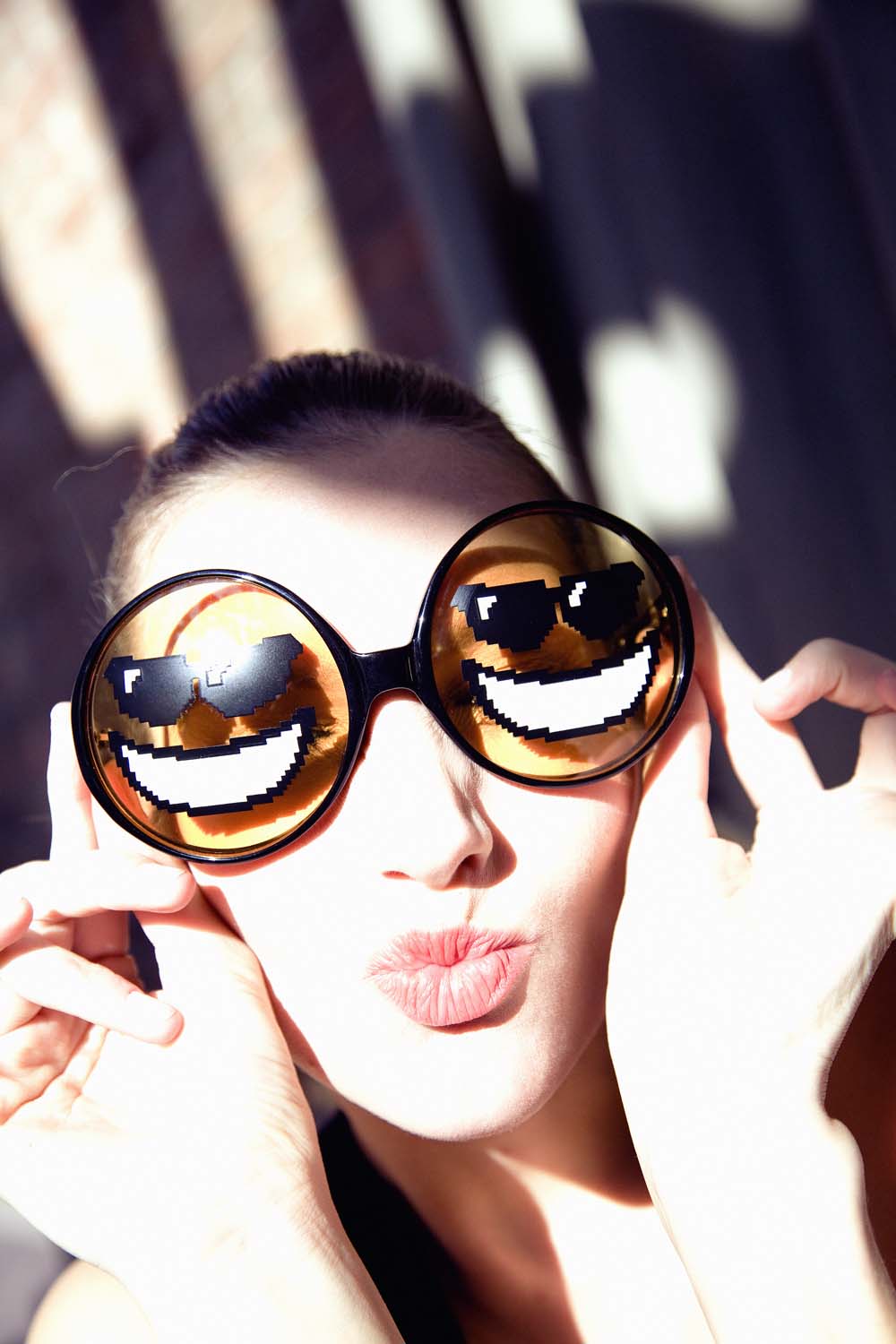
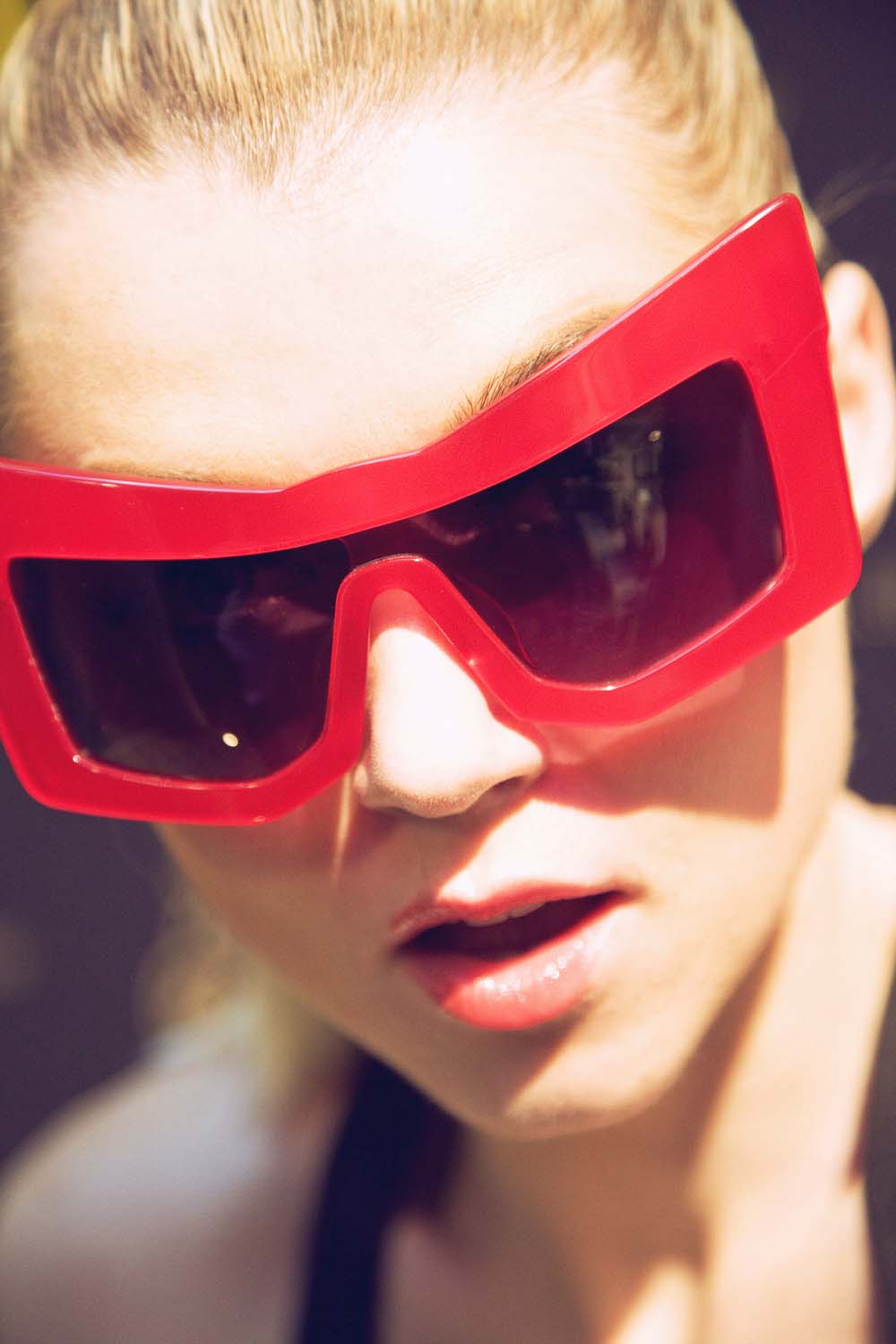
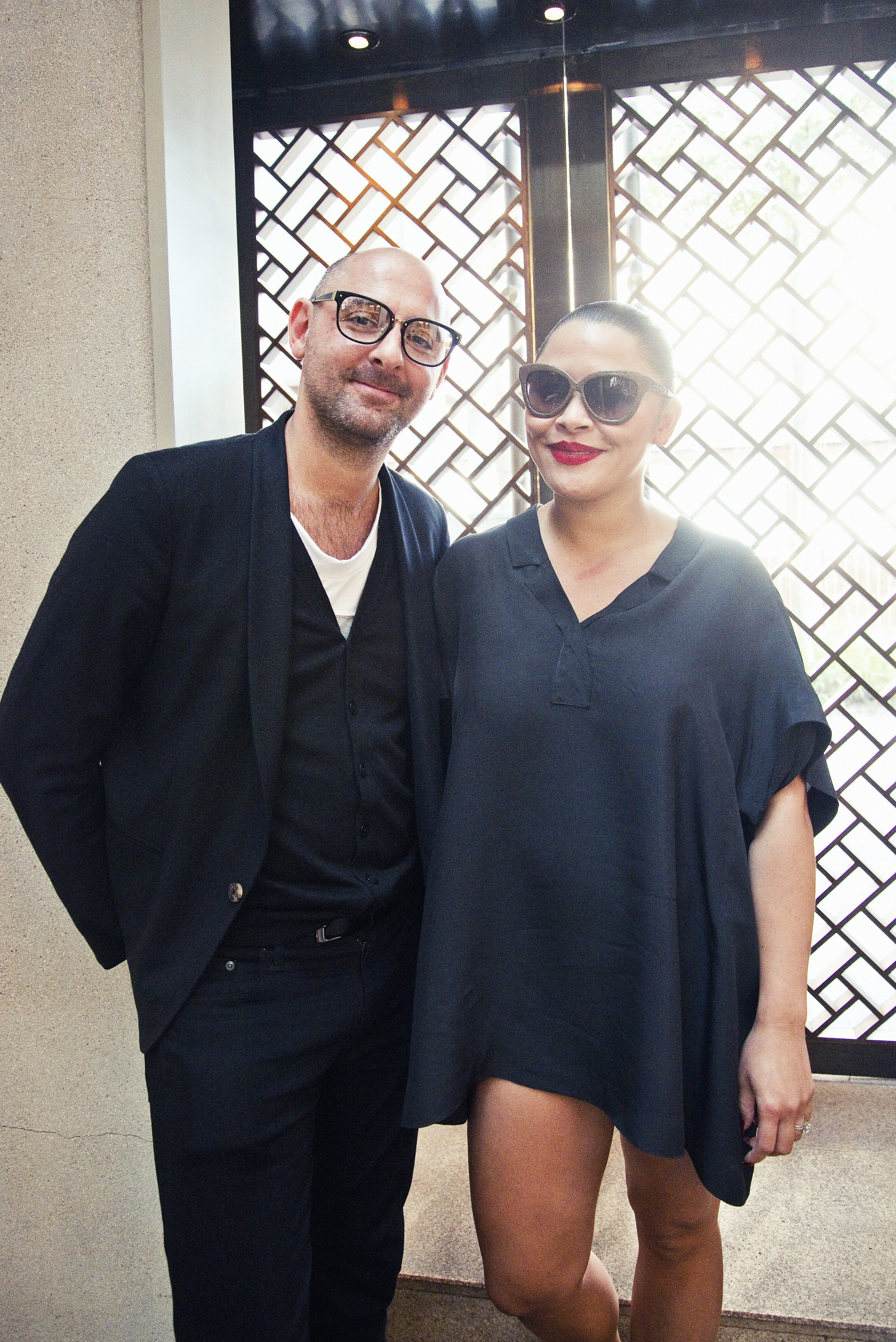
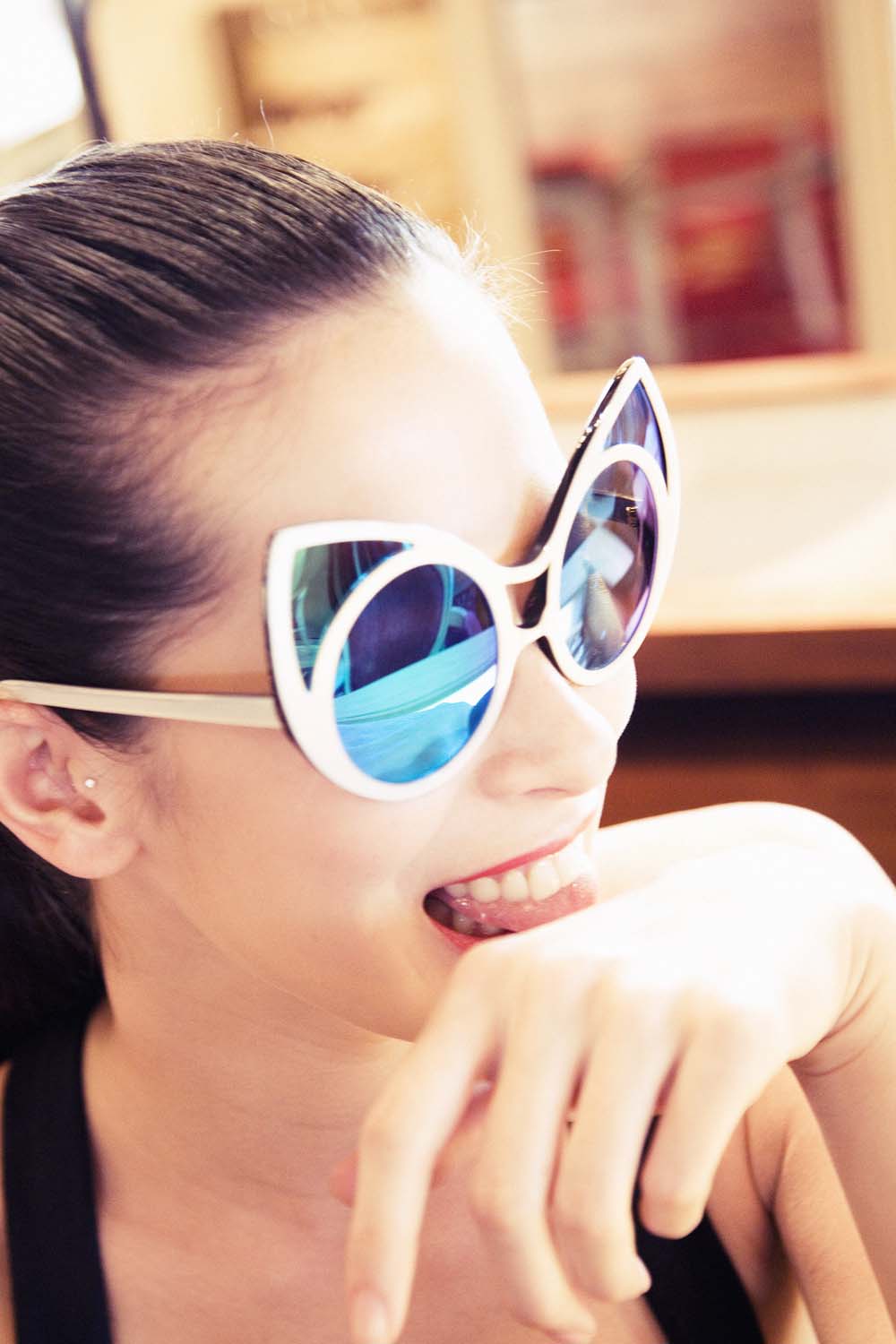
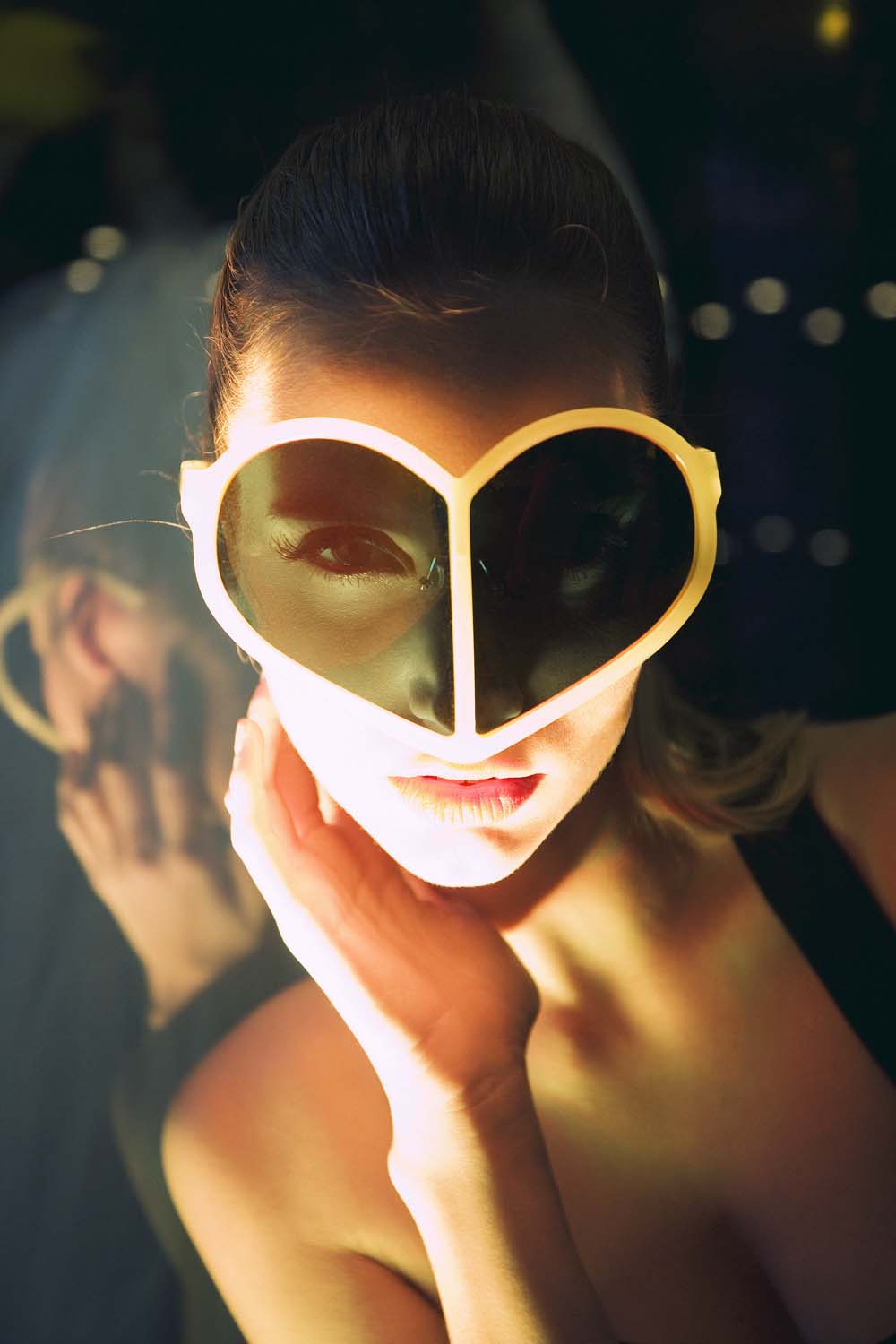
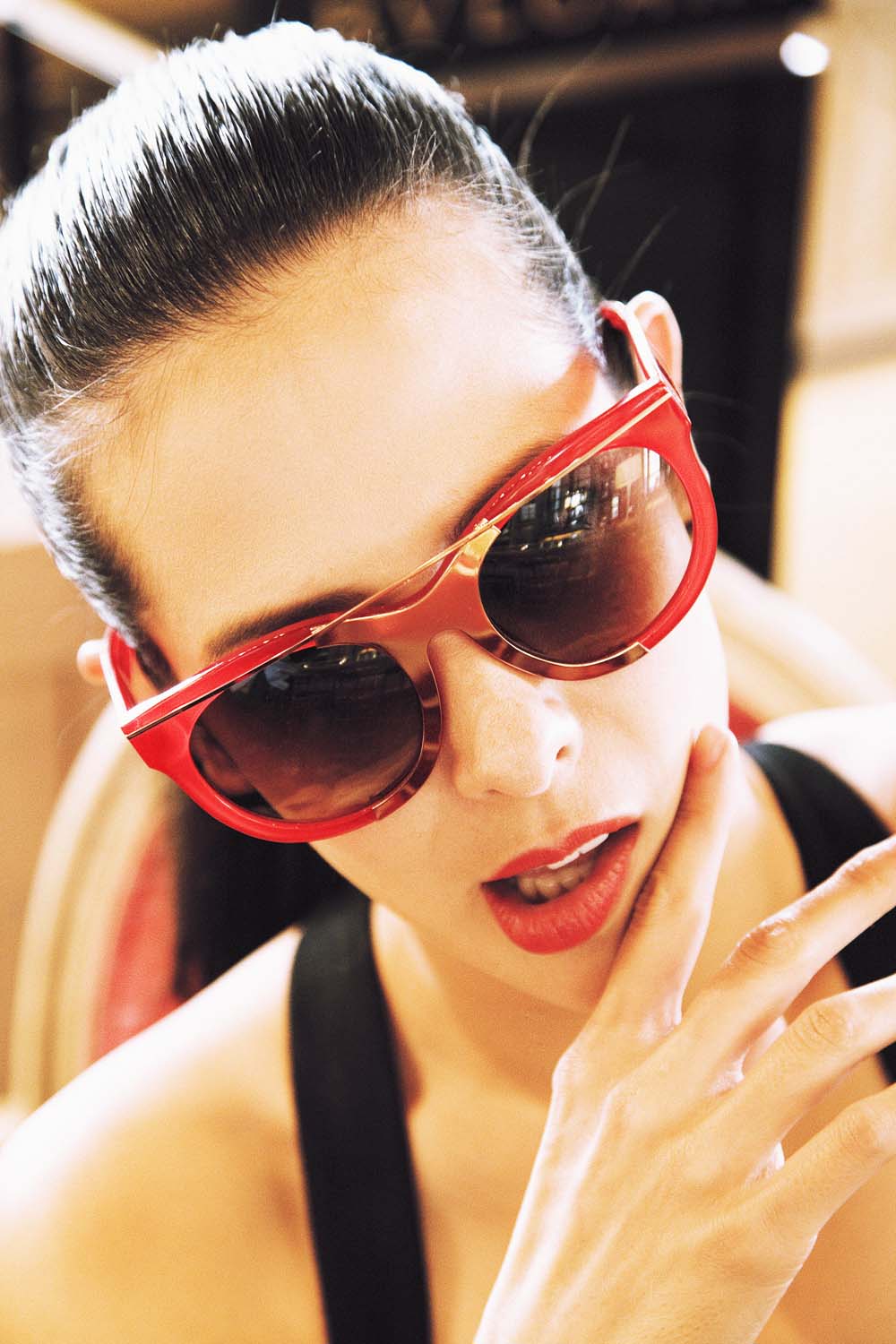
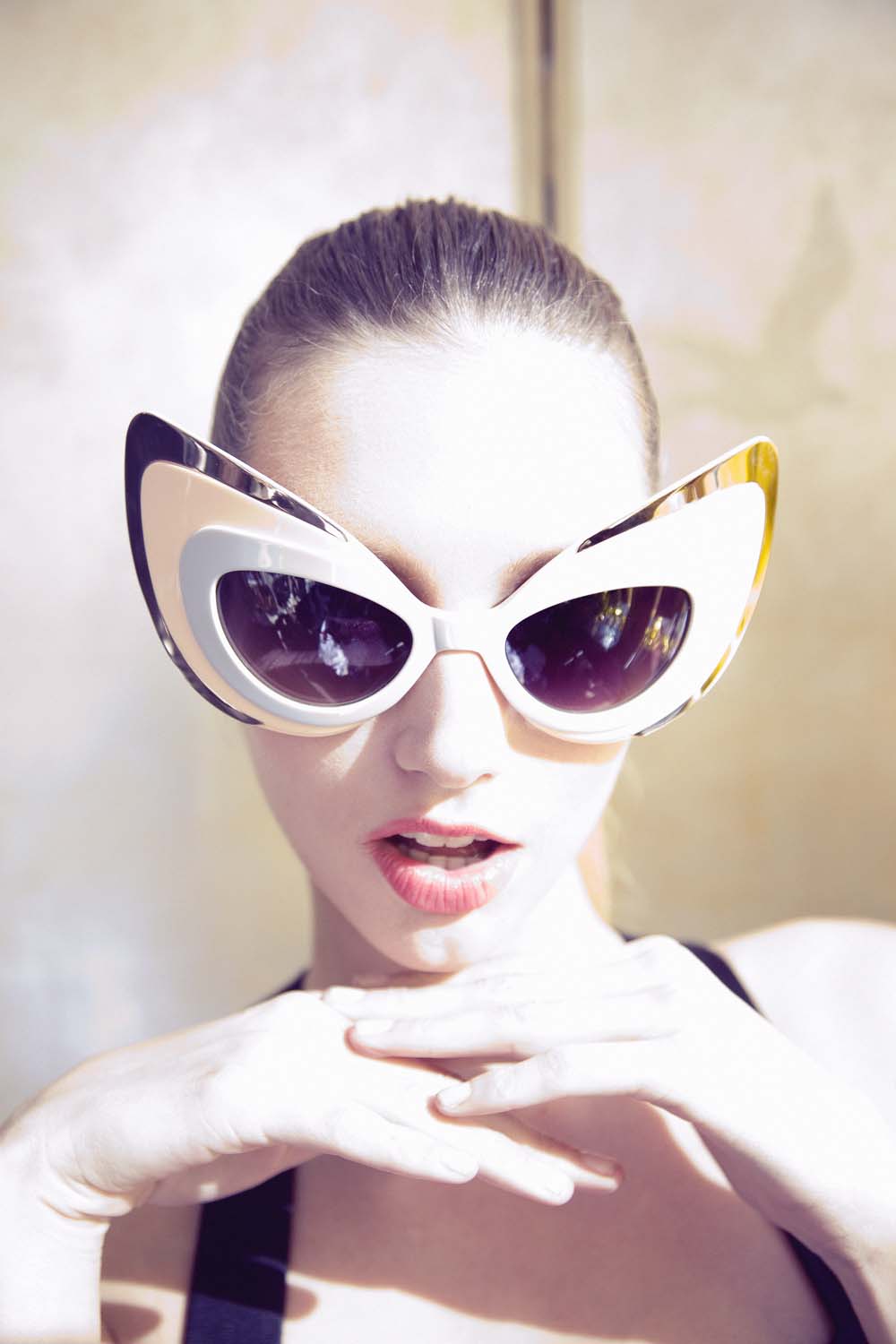


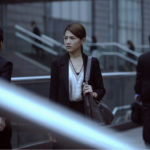
Speak Your Mind